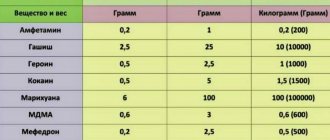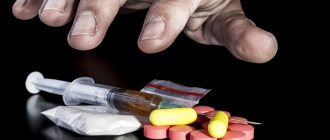Drugs are the scourge of modern youth.
Today, the country's prisons and detention centers are overcrowded with people convicted of possession and sale of narcotic drugs. Most of them are people aged 16 to 30 years.
Each of us has probably at least once seen young people searching for drug nests in our yards. Layouts are a good way to earn money for young boys and girls.
Unfortunately, not many of them know that this act will be recognized as sales, for which very severe criminal liability is provided.
Distribution of drugs (Article 228 of the Criminal Code of the Russian Federation) or their storage for personal use are socially dangerous crimes that have a negative impact on public health and the level of economic development of the country.
Features of drug addiction
Drugs are chemical substances, the circulation of which is legally limited, that have a psychotropic, sedative or stimulating effect on the human body. The use of such substances results in persistent mental and physical dependence.
The fight against drug addiction is overwhelming for those who are trying to get out of this circle on their own. Young people or their parents have to seek help from drug addiction or rehabilitation centers.
Every year the list of prohibited drugs expands with the emergence of new types or the improvement of existing formulas of substances.
Drug manufacturers, trying to circumvent existing laws, change the chemical formulas of substances or the proportions of their components, thereby creating new drugs that are not yet included in the list of prohibited drugs.
The following categories of people are at risk of potential drug addiction:
- Driven people;
- Children from dysfunctional families or families of drug addicts;
- Children from too rich families, left to their own devices and with large amounts of unearned money at their disposal;
- Young people who want to get “quick money”;
- People who are lonely or severely depressed;
- Unemployed;
- People who have access to drugs due to their official position.
In fact, anyone can become a drug addict . No matter how hard law enforcement officers fight against dope suppliers, it is still extremely easy to buy it.
List of narcotic drugs
What can be considered a prohibited substance is strictly regulated. In Russia, the list of narcotic substances is determined by Decree of the Government of the Russian Federation No. 681.
In addition, information of a similar nature is reflected in international documents - the Single Convention on Narcotic Drugs, the UN Convention against Illicit Trafficking in Narcotic Drugs.
According to the Decree of the Government of the Russian Federation, drugs include:
- Drugs of synthetic origin;
- Naturally occurring drugs;
- Prohibited medications;
- Certain types of plants and their parts;
- Psychotropic substances and their precursors.
The spread of drugs acutely poses the problem of the development of HIV infections.
The list of prohibited substances is presented in two groups:
- Prohibited substances - their circulation is permitted only for educational and scientific purposes, for operational investigative activities and for the purpose of destruction.
- Restricted substances - used mainly for medical purposes.
The general classification of narcotic drugs is presented as follows:
- Poppy-based drugs;
- Cannabis-based drugs;
- Psychostimulants;
- Sleeping pills;
- Sedative drugs;
- Hallucinogens;
- Volatiles.
Each drug has a specific effect on the body. Some cause a particularly severe form of addiction, while others must be used systematically to create a lasting addiction.
Drug distribution: characteristics of the crime
Distribution of drugs is a criminal offense. It is worth noting that such a term as “distribution” is absent in legal norms; instead, the term “sales” and forwarding is used. This is exactly the terminology used in Article 228.1. Criminal Code.
Art. is devoted to certain aspects of drug distribution. 228.2 of the Criminal Code. It contains a description of the punishment for violating the current rules for the sale and dispensing of narcotic drugs. The subject of such a crime can only be special. This is a pharmacy pharmacist, pharmacist, doctor, employee of a specialized laboratory.
The public danger of the spread of drugs is that their unpunished sale has an extremely negative impact on the health of citizens, the socio-psychological atmosphere, law and order, the economy and other areas of public life.
The subject of this crime is:
- narcotic drugs of natural and synthetic origin;
- psychotropic substances;
- their analogues;
- plants containing narcotic/psychotropic substances or parts thereof.
The list of narcotic substances subject to control is contained in Government Decree No. 681 of 1998, Single Convention on Narcotic Drugs of 1961, Art. 12 of the UN Convention against Illicit Traffic in Narcotic and Psychotropic Substances.
Illegal drug sales are any methods of transferring narcotic drugs to other persons for a fee or free of charge. It means sale, gift, loan, exchange, payment of debt and alternative methods of sale (for example, injection).
Sales cannot be understood as the following actions:
- getting rid of drugs by leaving them in a certain place or throwing them in the trash;
- injecting another person if the drugs belong to him;
- purchase of drugs by an intermediary in an amount that is commensurate with individual consumption using the consumer’s funds and at his request (in this case we are not talking about sales, but about assistance);
- purchasing narcotic drugs to help an animal.
The presence of a crime can be indirectly indicated by: a significant amount of narcotic drugs, a preliminary agreement with the consumer, an industrial method of production, specific packaging, etc. To initiate a criminal case and bring criminals to justice, it does not matter where exactly the sale of drugs was planned: on the territory of the country or beyond.
The sale of narcotic drugs is considered completed from the moment they pass into the possession of another person. Moreover, the form of transfer of prohibited substances can be any and does not affect the qualification of the crime (for example, hiding places, transfer through the fence of the colony, use of animals, third parties, etc.).
The illegal transfer of drugs means their movement to the recipient without direct participation in the movement of the sender. For example, by mail, by parcel, by air or other means of transport. Responsibility for delivery begins from the moment the letter, luggage or parcel containing drugs is sent.
The corpus delicti is formal ; the crime is considered completed from the moment of commission of any of the considered actions.
The subjective side of the crime is characterized by direct intent , i.e. the criminal is well aware of the social danger of the acts committed.
Responsibility for drug distribution
According to current legislation, several types of activities are classified as prohibited activities related to narcotic substances.
The following may be recognized as a criminal offense or administrative offense:
- Acquisition;
- Shipping;
- Storage;
- Recycling;
- Manufacturing;
- Production;
- Sales;
- Forwarding.
Simply put, any activity involving drugs is illegal unless you are a laboratory technician or a doctor.
Corpus delicti
Selling or distributing drugs does not always involve making a profit. The transaction does not have to be paid.
Distribution of drugs also includes giving illegal substances as a gift, treating a friend, giving him an injection, repaying a debt or making a loan. Laying out bookmarks is the most common sales option.
The corpus delicti under Art. 228.1 of the Criminal Code of the Russian Federation is as follows:
- The object of the crime is public safety and the health of citizens;
- The objective side of the crime suggests a variety of ways to sell drugs. Throwing illegal drugs into trash cans, providing assistance in purchasing drugs, or administering injections when the substances belong to the consumer will not be considered sales.
- The subject of the crime is a sane person aged 16 years in all cases, except for paragraph “c” of Part 4, where only a person who has reached 18 years of age is liable.
- The subjective side reflects direct intent. Every day, from all sides, people receive information about the dangers of drugs and the serious responsibility for these crimes. Even despite their awareness, they continue to deliberately engage in this socially dangerous act.
The crime is considered completed from the moment the drugs pass into the possession of another person.
What is the punishment under the Code of Administrative Offenses of the Russian Federation?
Administrative violations in the field of illicit drug trafficking or consumption are regulated by Art. 6.8 and art. 6.9 Code of Administrative Offenses of the Russian Federation.
Art. 6.8 of the Code of Administrative Offenses of the Russian Federation provides for liability for the acquisition or possession of drugs without the purpose of sale. For such a violation, a fine in the amount of 4 to 5 thousand rubles or administrative arrest for up to 15 days will be applied to the person.
If the same actions were committed by a stateless person or a foreigner, then, in addition to the main type of punishment, an additional punishment will be applied to him - deportation from the country.
If the offender voluntarily surrenders drugs acquired without the purpose of selling, he is released from liability.
Art. 6.9 of the Code of Administrative Offenses of the Russian Federation regulates violations of drug use without a doctor’s permission or cases of refusal to undergo an examination. The size of the punishment remains the same.
Sales cannot be recognized as an administrative offense. Sales are always criminally punishable, and with real imprisonment for the convicted person.
How much do they give for drug distribution under Art. 228 of the Criminal Code of the Russian Federation?
All types of liability for crimes in the field of drug trafficking are selected based on the size of the narcotic substances. The size can be significant, large or particularly large.
Art. 228 of the Criminal Code of the Russian Federation does not consider sales issues; it regulates only issues of storage and consumption without the purpose of distribution.
For a significant amount of drugs, the maximum term of imprisonment is set at 3 years, for a large amount - 10 years, for an especially large amount - 15 years.
Which article directly regulates liability for the distribution of narcotic drugs? Sales threaten even more serious prison terms. Issues of drug distribution are reflected in Art. 228.1 of the Criminal Code of the Russian Federation.
What is the term for drug distribution under the Criminal Code of the Russian Federation? Regular sales under Part 1 of Art. 228.1 of the Criminal Code of the Russian Federation entails liability in the form of imprisonment from 4 to 8 years.
The following are recognized as qualifying features and aggravating circumstances in a crime:
- Sales in correctional or educational institutions, in public or leisure places, in transport or in sports institutions;
- Implementation using the media or the Internet;
- When committed by a group of persons by prior conspiracy;
- Committing an organized crime;
- Sales using official position;
- Selling drugs to a minor;
- Sales on a significant, large or especially large scale.
Distribution of narcotic drugs in a significant amount threatens with a real prison term of 15 years, in large and especially large quantities - in 20 years.
Additionally, the legislator provides for penalties for criminals in the amount of up to 1 million rubles.
Responsibility for drug sales
Sale is the transfer of narcotic substances to another person, both for compensation and gratuitously, including for storage. Intent to commit a crime will be considered the manufacture, acquisition, packaging, transportation of narcotic substances by a person who does not use drugs (transporting drugs across the border is considered smuggling of potent substances - details here). Responsibility under this article begins at the age of 16. Responsibility will be borne by persons involved in the distribution of not only drugs, but also drug-containing drugs, narcotic plants, from which drugs can be extracted through processing.
The maximum penalty for drug distribution under the first part of Article 228.1 is from 4 to 8 years in prison. According to this part, the crime is qualified if there are no aggravating circumstances listed in subsequent parts of the article.
Watch in the video how a family of 11 people were convicted of illegal drug sales
According to Part 2 of Article 228. The Criminal Code of the Russian Federation classifies a crime committed in public places, schools, train stations, as the transfer of drugs to pre-trial detention centers and colonies. This also includes the sale of drugs through the media and the Internet. The term of imprisonment ranges from 5 to 12 years, the offender can be fined 500 thousand rubles, or the average monthly income for 3 years, in addition to restriction of freedom for a period of 1 year.
Part three of the article for drug trafficking states: if there were several accomplices in the crime, or a significant batch of drugs was sold, then the maximum sentence for a group crime is from 8 to 15 years, with or without a fine of up to half a million and restriction of freedom for 2 years.
It is worth noting: you can get a prison sentence of 1 to 7 years without even distributing narcotic substances, but only by providing premises for a drug den. In the article https://lexconsult.online/6430-tyuremnoe-zaklyuchenie-za-soderzhanie-narkopritona you can find more detailed information about the responsibility for organizing a den for drug addicts.
If the crimes provided for in parts 1 to 3 of Article 228.1 were committed:
- organized group;
- a person in case of abuse of official position;
- adults in relation to a person under 18 years of age;
- on a large scale; —
the term of imprisonment will be from 10 to 20 years and/or with a ban on holding certain positions for a period of up to 20 years. The amount of the fine increases to 1 million rubles or the average monthly earnings of the offender for 5 years.
Persons detained for selling drugs on an especially large scale under Part 5 of Art. 228.1 of the Criminal Code of the Russian Federation will be prosecuted with imprisonment from 10 to 20 years or life. Penalties are identical to Part 4 of this article. There is deprivation of the right to engage in certain types of activities and hold responsible positions.
The methods of distribution of narcotic substances and punishment for these crimes will be discussed in the following video.
How to correctly determine the size of drugs?
Size is of significant importance in this criminal act. The correct qualification and the time that the convicted person will spend behind bars depends on it. But getting a suspended sentence for selling drugs is unrealistic, you shouldn’t even dream about it.
All drugs presented below are considered completely prohibited . Their sizes are determined by the following values:
- Spice : significant - 0.01 g, especially large - 500 g;
- Heroin : significant - 0.5 g, large - 2.5 g, especially large - 1 kg;
- Opium : significant - 1 g, large - 25 g, especially large - 5 kg;
- Anasha, hemp, hashish : significant - 2 g, large - 25 g, especially large - 10 kg;
- Ecstasy-type tablets and their derivatives : large - 0.6 g, large - 3 g, especially large - 600 g;
- Methamphetamine : significant - 0.3 g, large - 2.5 g, especially large - 500 g;
- LSD : significant - 0.0001 g, large - 0.005 g, especially large - 0.1 g;
- Ephedrone : significant - 0.2 g, large - 2.5 g, especially large - 500 g.
Obviously, the most stringent size requirements apply to the drugs LSD . They have a very simulating effect on the body, quickly wear out the cardiovascular system, which is why heart attacks and strokes often occur from an overdose.
Judicial practice for 2022
According to statistics, the number of crimes in the field of drug trafficking is growing rapidly. In 2022, the number of such cases has tripled. The number of cases of drug sales increased by 9% compared to the previous year.
Drug addicts and drug traffickers make up one third of all convicts according to the Federal Penitentiary Service of the Russian Federation.
And these huge figures are recorded even though half of these cases remain unsolved. That is, in fact, there should be even more such criminals.
Moreover, the bulk of those convicted are ordinary drug addicts who were convicted of possessing drugs purchased for themselves . Large dealers, however, continue to walk free, only regularly replacing jailed “runners” with new ones.
When convicting criminals for drug possession, investigators, by default, charge them with purchasing prohibited drugs, although they often do not actually prove this. This is not entirely correct, because this violates the rights of the convicted.
The bulk of drug distribution cases are solved by “live fishing,” when police officers themselves contact traffickers on social networks and catch them at the moment of laying out bookmarks.
Drug addiction is a serious problem not only in third world countries, where selling illegal substances is the only way to make money.
Unfortunately, drug addiction is rapidly spreading in civilized developed countries of the world. In Russia, the number of crimes under Art. 228 and art. 228.1 of the Criminal Code of the Russian Federation raises serious concerns about the future of our youth.
Arbitrage practice
Let's consider how many years they give for drug distribution, based on judicial practice.
Citizen F., was previously convicted under Art. 228.1 part 1 and article 228 part 5 for distribution of the narcotic mixture methadone in the amount of 0.108 g. Such a batch is considered especially large. The regional court of the Leningrad region sentenced citizen F. to 14 years in a maximum security colony. Citizen F. appealed the verdict, citing difficult life circumstances. The Supreme Court of the Russian Federation left the decision unchanged, since when pronouncing the sentence, the Leningrad Regional Court took into account mitigating circumstances, positive characteristics, the fact that the crime was committed for the first time, and applied Art. 64 of the Criminal Code of the Russian Federation, imposing a punishment below the lower limit of Part 5 of Art. 228.1 of the Criminal Code of the Russian Federation.
If you still have questions about punishment for drug sales, ask them in the comments to the article









